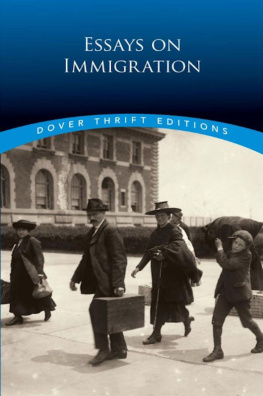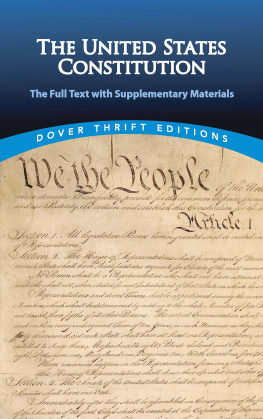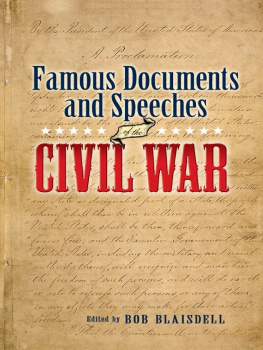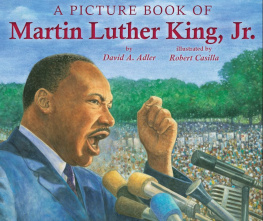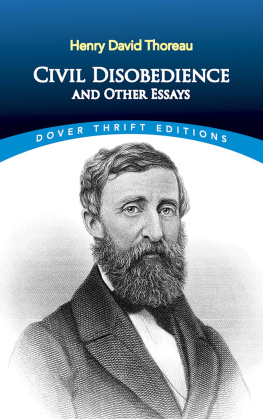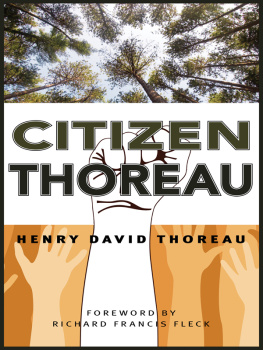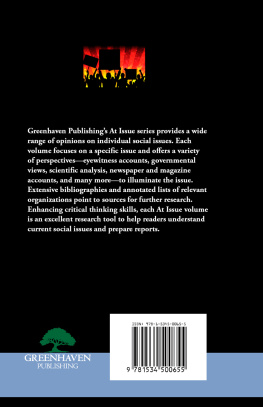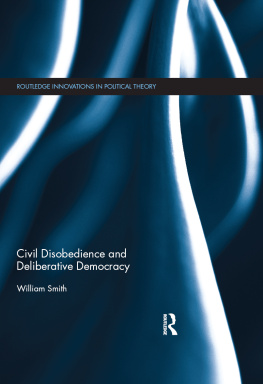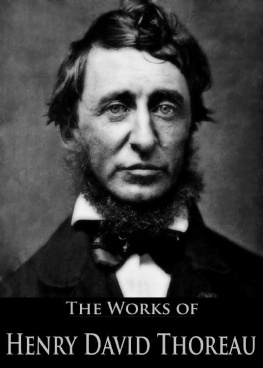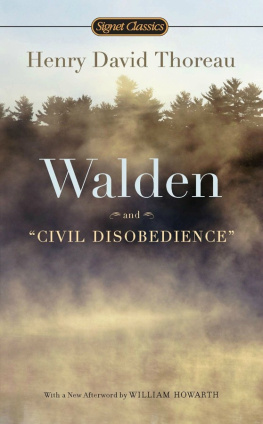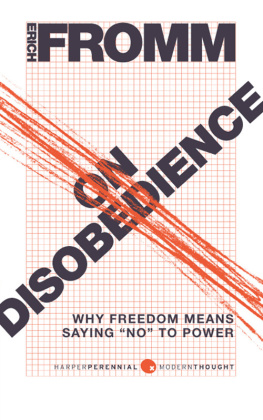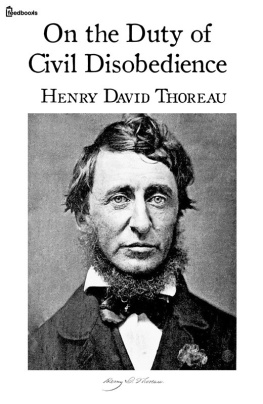ESSAYS ON CIVIL DISOBEDIENCE

Edited by
Bob Blaisdell
DOVER PUBLICATIONS, INC.
MINEOLA, NEW YORK
DOVER THRIFT EDITIONS
GENERAL EDITOR: SUSAN L. RATTINER
EDITOR OF THIS VOLUME: JANET B. KOPITO
ACKNOWLEDGMENTS: See
Copyright
Copyright 2016 by Dover Publications, Inc.
All rights reserved.
Bibliographical Note
Essays on Civil Disobedience, first published by Dover Publications, Inc., in 2016, is a new compilation of essays, reprinted from standard editions. Bob Blaisdell has selected the essays and provided the introductory Note and brief biographies. Spelling inconsistencies and the like derive from the sources and have been retained for the sake of authenticity.
Library of Congress Cataloging-in-Publication Data
Names: Blaisdell, Robert, editor.
Title: Essays on civil disobedience / edited by Bob Blaisdell.
Description: Mineola, New York : Dover Publications, 2016. | Series: Dover thrift editions
Identifiers: LCCN 2015039464| ISBN 9780486793818 (paperback) | ISBN 0486793818 | eISBN 9780486812038
Subjects: LCSH: Civil disobedience. | BISAC: HISTORY / Americas (North, Central, South, West Indies). | HISTORY / Modern / 20th Century. | LITERARY COLLECTIONS / Essays.
Classification: LCC JC328.3 .E85 2016 | DDC 303.6/1--dc23 LC record available at http://lccn.loc.gov/2015039464
Manufactured in the United States by RR Donnelley
79381801 2016
www.doverpublications.com
Note
ITS HARDER TO say what civil disobedience is than what it does. What it does is prick our conscience to consider the morality of a particular law. Then it attempts to persuade us that the law being disobeyed is unjust. If civil disobedience results in its participants being arrested or attacked, no violence is returned. In court or in public media, persuasion will be attempted again. Civil disobedience is a brave and necessarily lonely and outnumbered action. The philosopher Tony Milligan has tried to define civil disobedience right up to and including the Occupy Wall Street protests of 20112012, and concedes that the idealism of practicing civil disobedience, being a human endeavor, necessarily has failures: Even if we take a comparatively minimal view of what civil disobedience involves, i.e. non-violent but principled law-breaking, it may be pointed out that from Spain to London, and from San Francisco to Zuccotti Park, there was sporadic violence. Such violence, albeit at a low level, could hardly be avoided given the movements scale and diversity, not to mention its refusal to sanction any disciplining leadership.
We know that Mahatma Gandhi inspired a vast and important civil disobedience movement in his native India and relied on overcoming religious prejudices and differences. But there is no gainsaying that its origins, as understood by the giant of Russian civil disobedience, Leo Tolstoy, belonged to the principle of nonresistance described by Jesus Christ in the Sermon on the Mount in the Gospel According to Matthew: Ye have heard that it hath been said, An eye for an eye, and a tooth for a tooth: but I say unto you, That ye resist not evil: but whosoever shall smite thee on thy right cheek, turn to him the other also. Tolstoy believed that the sense of morality was inherent in every person (The Kingdom of God is Within You) and was independent of dogmatic religion. He insisted that the value of Jesus principles were founded on their truth rather than on Jesus status as a divinity. His excited discussions in books and essays of his understanding of Christs teachings brought him into conflict with the Russian church and state, whose power-sharing had resulted in continual warfare with other nations and peoples, and at home in the subjugation of tens of millions of peasants. Tolstoy proved (to his and our satisfaction) that the violent actions of the civilized world, the Russian church and government included, contradicted the most fundamental Christian beliefs: After eighteen hundred years of education in Christianity the civilized world, as represented by its most advanced thinkers, holds the conviction that the Christian religion is a religion of dogmas; that its teaching in relation to life is unreasonable, and is an exaggeration, subversive of the real lawful obligations of morality consistent with the nature of man; and that very doctrine of retribution which Christ rejected, and in place of which he put his teaching, is more practically useful for us.
To learned men the doctrine of nonresistance to evil by force is exaggerated and even irrational. Christianity is much better without it, they think, not observing closely what Christianity, as represented by them, amounts to.
They do not see that to say that the doctrine of nonresistance to evil is an exaggeration in Christs teaching is just like saying that the statement of the equality of the radii of a circle is an exaggeration in the definition of a circle. And those who speak thus are acting precisely like a man who, having no idea of what a circle is, should declare that this requirement, that every point of the circumference should be an equal distance from the center, is exaggerated. To advocate the rejection of Christs command of nonresistance to evil, or its adaptation to the needs of life, implies a misunderstanding of the teaching of Christ.
The utopian minister Adin Ballou, much less famous than his contemporary civilly disobedient fellow Americans William Lloyd Garrison and Henry David Thoreau, happily answered a favorite criticism of the absolute pacifism he practiced: I do firmly believe that in acting out these principles steadily and consistently, I shall continue longer uninjured, longer in the enjoyment of life, and longer safe from the depredations, assaults, and murderous violence of wicked men than with all the swords, guns, pistols, dirks, peace officers, sheriffs, judges, prisons, and gallows of the world. If this is the faith of a fool, then am I willing to be accounted a fool, until time shall test the merits of my position. It may not prove to be such great folly after all. Well, says the objector, I should like to know how you would manage matters if the ruffian should actually break into your house with settled intent to rob and murder. Would you shrink back like a coward and see your wife and children slaughtered before your eyes? I cannot tell how I might act in such a dreadful emergencyhow weak and frail I should prove. But I can tell how I ought to acthow I should wish to act. If I am a firm, consistent non-resistant, I should prove myself no coward; for it requires the noblest courage and the highest fortitude to be a true non-resistant. If I am what I ought to be, I should be calm and unruffled by the alarm at my door. I should meet my wretched fellow-man with a spirit, an air, a salutation, and a deportment so Christ-like, so little expected, so confounding, and so morally irresistible that in all probability his weapons of violence and death would fall harmless to his side.
Sixty-five years later Tolstoy was also answering the taunting critics of nonresistance: The other day in one of the most progressive periodicals I read the opinion of an educated and intelligent writer, expressed with complete assurance in its correctness, that the recognition by me of the principle of nonresistance to evil by violence is a lamentable and somewhat comic delusion which, taking into consideration my old age and certain merits, can only be passed over in indulgent silence.
Exactly the same attitude towards this question did I encounter in my conversation with the remarkably intelligent and progressive American [William Jennings] Bryan. He also, with the evident intention of gently and courteously showing me my delusion, asked me how I explained my strange principle of nonresistance to evil by violence, and as usual he brought forward the argument, which seems to everyone irrefutable, of the brigand who kills or violates a child. I told him that I recognize nonresistance to evil by violence because, having lived seventy-five years, I have never, except in discussions, encountered that fantastic brigand, who, before my eyes, desired to kill or violate a child, but that perpetually I did and do see not one but millions of brigands using violence towards children and women and men and old people and all the laborers in the name of the recognized right of violence over ones fellows. When I said this my kind interlocutor, with his naturally quick perception, not giving me time to finish, laughed, and recognized that my argument was satisfactory.
Next page



